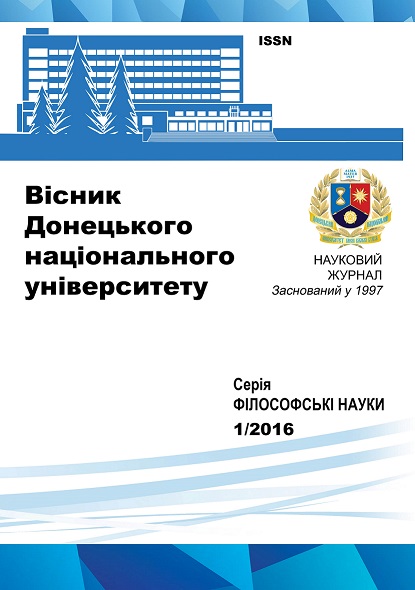The Development of Social Constructivizm Paradigm in the History of Social and Philosophical Thought.
Keywords:
social constructivism, society, values, interaction, constructs, orders of interactionsAbstract
This article focuses on the theoretical filling and the need to update the paradigm in terms of social construction at the beginning of the XXI century. The author determined the specific properties of historical processes of social design techniques that laid the foundation for the design of the current state direction. The work is defined as the philosophical, historical and pragmatic reasons for the transformation of views on society and its research methods. From the beginning, the author begins to review the historical-philosophical subtext formation constructivist views. At the same time the text specified features views of the copyright status of the social whole in a single historical time: from Ancient Greece to the end of the twentieth century. The author points out the features, trends and benefits of each model constructivist thinking in particular social and indicates those trends that have become critical to the attention of philosophers. The article showing historical changes format design, social phenomenon appears when such radically changing, complicated, supplemented, and therefore it is extremely difficult to investigate. Also indicated on election issues researchers base, through which the vision will be social trends. It constantly mutates, carries its own accents and late twentieth century brings their attention to postmaterialne and virtual. Marked communication and continuity of various philosophers and their views are defined phenomena and social phenomena that are the connecting element between constructivist theories direction as a whole. The author states the basis on which built social process design or its individual structures. She phenomena are the language and everyday life, beyond which it is impossible to construct a theoretical construct of social and practical content that form our social existence. Direct heredity in the views of philosophers of different eras, they attempt to create a theoretical construct, which would be the most appropriate era, to be classified as "constructivists" quite a wide range of great philosophers and researchers of social space. The author notes "triple" structure of social constructivism, skepticism, phenomenology, symbolic interactionism of which has its roots direction. Highlights the versatility of constructivism as research methods of social space and the order of interaction of individuals within it. The main idea of the article is the vision necessary most precise possible most specific understanding of the relationship between the surrounding natural environment created by social reality and perceptions of each individual on the environment in which it exists. The text concludes that the Humanities, especially in the social-philosophical field, began vyokremlyuvatysya constructivist approach like generalizes the essence interdisciplinary, allowing more adequately and prognostic about the real state of social processes and relationships describe the picture of social reality.References
Релятивизм как болезнь современной философии / Под ред. В. А. Лекторского. – М.: Канон+, 2015. – 392 с.
Алексеева Т. А. Мыслить конструктивистски: открывая многоголосый мир / Т.А. Алексеева // Сравнительная политика. – 2014. – № 1. – C.4–21.
Хлебалин А. В. Эссенциализм и антиэссенциализм в модальной логике / А. В. Хлебалин // Философия науки. – 2003. – № 2. – С. 34–46.
Фрагменты ранних греческих философов. Ч. I / пер. А. В. Лебедева. – М.: Наука, 1989. – 576 c.
Розенгрен М. Тезис Протагора: доксологическая перспектива / М. Розенгрен // Вопросы философии. – 2014. – № 5. – С. 171–178.
Платон. Тимей / пер. С. С. Аверинцева // Платон. Соч. Т. 3. – С. 421– 500.
StorigH. Kliene Weltgeschichte der Philosophic // Frankfurt am Main, 1992. – 458 s.
Helferich С Geschichte der Philosophic // Aufl, Stuttgart, 1992. – 780 s.
Декарт Р. Сочинения в 2-х т: Т. 2. / Рене Декарт. – М.: 1994. – 625 с.
Berkeley G. Philosophical commentaries / G. Berkeley // London, 1948, Vol. 1. – 541 p.
Hume D. Philosophical Essays Concerning Human Understanding / D. Hume. – Essay XII, Liberty Fund, Inc., 1987, – 427 p.
Ritzel W. Immanuel Kant: eine Biographie / W. Ritzel – Berlin: N. Y., 1985. – 736 p.
Розин В. М. Феноменология глазами методолога / В. М. Розин // Вопросы философии. – 2008. – № 5. – С. 116–126.
Schutz A. The Problem of Social Reality / A. Schutz // The Hague, Martinus Hijhoff, 1973.
Бергер П., Лукман Т. Социальное конструирование реальности: Трактат по социологии знания / П. Бергер, Т. Лукман; Пер. с англ. Е. Руткевич. – М.: Academia-Центр Медиум, 1995. – 323 с.
Гуссерль Э. Идеи к чистой феноменологии и феноменологической философии. Т. 1. [Текст] / Э. Гуссерль. – М.: Академический проект, 2009. – 489 с.
Гуссерль Э. Феноменология внутреннего сознания времени / Э. Гуссерль – М: Гнозис, 1994. – 162 с.
Мид Г. Дж. От жеста к символу / Г. Дж. Мид // Американская социологическая мысль – М.: МГУ, 1994. – 218 с.
Шюц А. О множественности реальностей / А. Шюц // Социологическое обозрение. – 2003. Т. 3, – № 2. – С. 3–34.
Гоффман И. Анализ фреймов: Эссе об организации повседневного опыта. / И. Гоффман – М.: ИС РАН, 2003. – 752 с.
Бурдье П. О символической власти / П. Бурдье // Социология социального пространства. – СПб.: Алетейя, 2007. – 288 с.
Бурдье П. Стратегии воспризводства и способы господства / П. Бурдье // Социология социального пространства. – СПб.: Алетейя, 2007. – 288 с.

